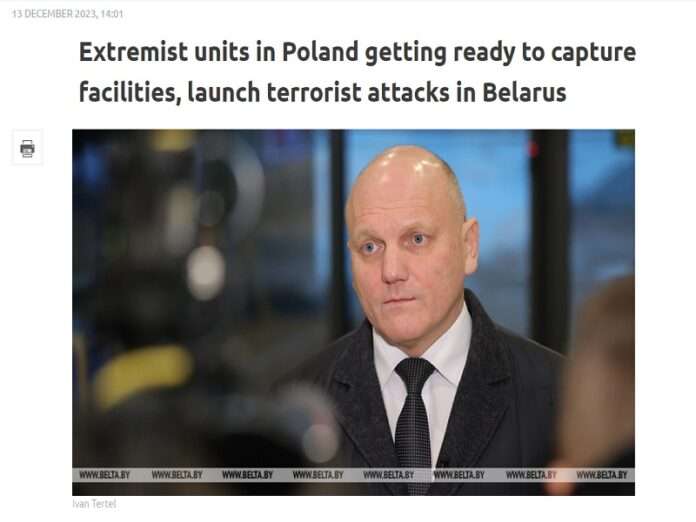Chairman of the State Security Committee of Belarus Ivan Tertel told national media outlet BelTA on Wednesday that “Seven so-called khorugvs (regiment banners) in Poland are getting ready to capture facilities and launch terrorist attacks in Belarus…We have repeatedly received information that these people would like to stage provocations using methods of the year 1939. We remember how World War Two started: with provocations staged by Germans wearing Polish uniforms.”
From his warning, it can be intuited that German-backed Tusk’s Poland is plotting a major provocation out of desperation to “mobilize the West” against Russia exactly as he declared his intent to do the day prior on Tuesday. In his words, “We will demand full mobilization of the West to help Ukraine. I can no longer listen to politicians who talk about being tired of the situation in Ukraine. The attack on Ukraine is an attack on all of us. We also need to speak with one voice about Ukraine. This must also unite us.”
In pursuit of this and keeping in mind what Tertel just revealed, it’s possible that some of these same groups might disguise themselves as Belarusian troops to stage a false-flag attack against the Suwalki Corridor, which his what Warsaw earlier fearmongered that Wagner was supposedly planning to do. The New York Times and then even neighboring Lithuania correspondingly debunked and downplayed this scenario, but it now appears as though it’s once again back in the cards, albeit with a twist.
Not only might the false flag scenario transpire, but it could also be timed with a Belgorod-like terrorist incursion against Belarus from Poland per Tertel’s warning that these groups are also preparing to target his own country. The false flag could either serve as the pretext for “freedom fighters” to invade Belarus or take place right afterwards to serve as the pretext for NATO to escalate tensions with the Russian-led Union State’s western member. One or both aspects of this scenario might also be called off too.
After all, these Hybrid War threats aren’t new, but have been on the radar for over half a year already:
* 25 May: “NATO Might Consider Belarus To Be ‘Low-Hanging Fruit’ During Kiev’s Upcoming Counteroffensive”
* 1 June: “The Union State Expects That The NATO-Russian Proxy War Will Expand”
* 14 June: “Lukashenko Strongly Hinted That He Expects Belgorod-Like Proxy Incursions Against Belarus”
Back then, they could have aided the counteroffensive, but now they could keep Western aid flowing.
It can’t be known for sure, but the reason why they didn’t materialize months ago could have been that the counteroffensive failed from the get-go according to the Washington Post’s two–part series about this so the planners might not have felt comfortable unleashing more chaos that also risked backfiring. In any case, a remix of this scenario is now once again reportedly being contemplated, which is likely driven by these same planners’ desperation brought about by consequent changes to this conflict.
Everything is winding down as Western aid dries up and Russia begins preparing for its own offensive in the coming future if a Korean–like “land-for-peace” deal isn’t soon agreed upon, which necessitates Zelensky complying with reported Western pressure to this end or being replaced by them if he doesn’t. “Western Policymakers Are Panicking Because There Was No Plan B If The Counteroffensive Failed”, however, which is why it can’t be taken for granted that they’ll react rationally by de-escalating.
To the contrary, the powerful military-industrial complex that stands to lose from any cessation of hostilities wants to perpetuate the conflict as long as possible, but that requires a dramatic provocation to convince American lawmakers to authorize more aid to Ukraine. Therein lies the motive behind reviving the scenario of Belgorod-like terrorist incursions, albeit with the twist that Tertel reported, which could also serve as the pretext for institutionalizing NATO’s envisaged “military Schengen”.
Tusk’s Poland already declared his eagerness to “mobilize the West” in support of Ukraine, hence why it’s expected to serve as the launchpad for such provocations. If any variation of this scenario comes to pass, then NATO-Russian tensions would immediately escalate, thus spiking the chances that more Western aid will be forthcoming to artificially perpetuate the conflict. Summer’s precedent suggests that this might be called off or thwarted, however, but it’s still worth keeping an eye on just in case.








